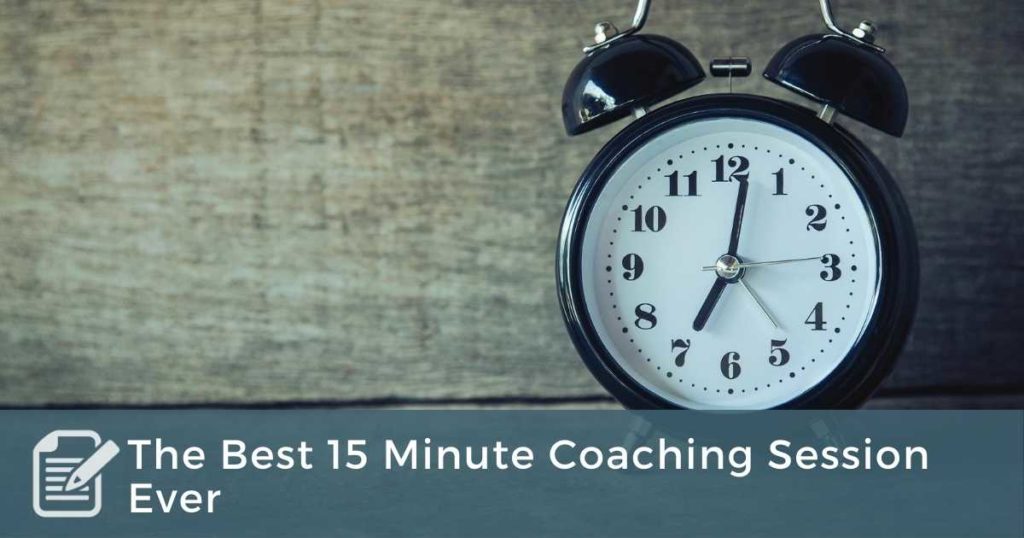 We train coaches at Coach Approach Ministries. And one thing that sets us apart is that when you train with us, you will do a lot of coaching. There are lots of ways to learn coaching, but perhaps the best way is to coach in front of others and get immediate feedback. When we do this, we always add one element that always makes it much harder. We limit the amount of time you have, anywhere from ten minutes to twenty.
We train coaches at Coach Approach Ministries. And one thing that sets us apart is that when you train with us, you will do a lot of coaching. There are lots of ways to learn coaching, but perhaps the best way is to coach in front of others and get immediate feedback. When we do this, we always add one element that always makes it much harder. We limit the amount of time you have, anywhere from ten minutes to twenty.
I don’t think I know one coach who prefers a fifteen minute session to a sixty minute session. There is something about the clock that makes us nervous. Fifteen minutes just isn’t enough time to establish a coaching relationship, discover an actionable topic, deeply explore the possibilities, design appropriate and action, and build in accountability. Too short!
Let me give you five advantages to short coaching sessions.
- You can concentrate on the person.
- You can clarify their desire.
- Use most powerful questions you have.
- You don’t have to stick the landing.
- Give the person permission to act.
You Can Concentrate on the Person
I don’t know anyone who can be fully present for an entire hour. At some point, you will lose focus and fade into another thought. But fifteen minutes is a nice challenge. Listen to every word your client says. Listen to how they say it. Listen for any pain behind it. Listen to when the joy releases. Listen to their word choices. Listen for where they get stuck. You won’t create a solution. You will hear it.
It is fair to say that no one has given them a full fifteen minutes of full presence in a long time. You will bring hope and healing just by making yourself available. Turn up your curiosity about what makes this person tick. Coach the person, not the problem.
You Can Clarify Their Desire
It is the rare client who knows exactly what they want to talk about. They may want to talk about the future, or a relationship, or an obstacle, but more often than not they can’t clearly articulate how they would like this issue to be different.
A great opening question is:
“If every step you take from here on out is exactly the right step, how will this situation be different a year from now?”
“How will you feel when you arrive at a preferred future?”
“What will be different when this is no longer an issue?”
If the client leaves after fifteen minutes being better able to articulate the troubling issue, you have done that client a great service. You may not have given them a next step, but you’ve given them a landmark.
To draw an analogy, it isn’t hard to find Union Station in Chicago once you learn to look up. It is just across the bridge from the tallest building in Chicago. I don’t need specific directions. I just need to move toward the landmark.
Use the Most Powerful Questions You Have
The hardest lesson to learn in coaching is that you don’t need the details to coach the client.
· I don’t need to know how old the children are to coach a mom into a parental action step.
· I don’t need to know anything about the elder who is causing so much trouble at the church.
· I don’t need to understand how a client’s pension is going to work to help her plan for her financial future.
· I don’t need to comprehend particle physics to help a theoretical physicist craft a new model of the universe.
We tend to think we can only coach what we know, and by believing that we set two limits on ourselves.
- We believe we can’t coach someone in an area where we have no experience.
- We limit the possibilities for the client when do have some experience.
Questions I would never ask:
“How long have you been at that church?”
“How much money have you been putting into investments each month?”
“What have you tried so far?”
The reason I would never ask those questions is because the client already knows the answer to those questions, and frankly, there is absolutely no need for the coach to know unless they secretly hope to solve the problem themselves. We have fifteen minutes. Let’s not take any time bringing ourselves up to speed. It isn’t the best use of our time.
Instead ask the most powerful discovery questions you can muster.
“How will your life be different after you hurdle this obstacle?”
“What does your ideal day look like, start to finish?”
“What does God see when He looks at your life?”
If you only have fifteen minutes, let the client walk away with as much new thinking as possible. You may not help them solve their problem, but they will have a lot of new ideas as they walk away from the conversation.
You Don’t Have to Stick the Landing
Gymnasts always finish their routine standing straight up, back arched, hands high in the air. Even if they stumble or fall. Coaches should do the same thing. With such a short time period, after asking the most powerful questions you can conjure, you can simply ask, “What are you taking away from this conversation so far?”
If you’ve helped the client think beyond where they had thought before, you can’t really even guess what they are thinking about the coaching topic at this point. So don’t grab onto something that sounded a bit like an action step somewhere in the conversation. Set everything back down on the table and ask them what they found most interesting so far. It may not even be something you discussed. All this discovery may have just provoked another thought.
If it is appropriate, you can ask, “What action would you like to take based on this new discovery?” We coaches are all about action, but don’t force an action just because it will make you feel like less of a failure as a coach. Fifteen minutes may just not produce an action. But fifteen minutes should always produce some new thinking.
It’s probably better to design one good action coming out of a short session rather than three flimsy action steps. Ask them to rate their one solid action step from 1 to 10, 1 being they aren’t going to take action on this at all, to 10, they would bust through a brick wall to take this action. If they aren’t a 10, ask them how they might move this number up one or two points.
Give the Person Permission to Act
Many clients are holding themselves back for one reason or another. They don’t feel like they have the proper authority to take an action or the appropriate resources or the educational background. Of course, you don’t want to encourage them to jump off a cliff into the rocks, but many times you should finish the coaching conversation with the truth.
“I love hearing the passion in your voice about this issue.”
“I want to encourage you to take this action. It sounds like what you are supposed to do.”
“Do it.”
It’s amazing how many times these words are jumping off my lips at the end of coaching conversations. I won’t say them unless they are true, but many people just need some encouragement to take action.
Fifteen Minutes Is Plenty of Time to Coach
The next time you get fifteen minutes to coach in a training session, or maybe you are just bold enough to ask someone to let you practice on them for fifteen minutes, try to use these five advantages. People will begin to look forward to when they get to be coached by you again.



3 thoughts on “The Best 15 Minute Coaching Session Ever”
Pingback: Ask More Powerful Questions | Coach Approach Ministries
Nice article. I’m a coach for frazzled home-based business owners and I’ve always said that those who don’t like 30 minutes coaching sessions haven’t tried it.
Super article! I have fallen into the role of “coach” with my 81-year-old ADHD dad & every phone call is a minimum of 60 minutes due to his distractibility. I find it a fun challenge to help him to stay on task so I’ve been keeping a list of “discovery” questions on my phone that I start the conversation with. It’s a slow process with him but slowly these questions are helping him to become more focused.